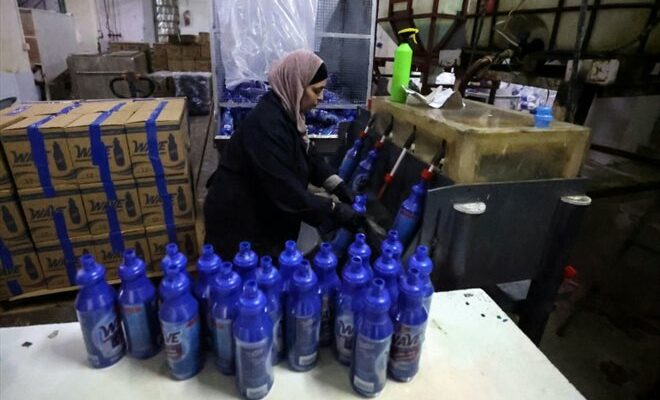Hafeth Ghazawneh in his falafel shop in al-Bireh, January 15, 2024 in the occupied West Bank (AFP/Jaafar ASHTIYEH)
In his small shop in al-Bireh, a town neighboring Ramallah in the occupied West Bank, Hafeth Ghazawneh is desperately waiting for customers: since October 7, only a handful have bought sandwiches and falafels from him.
Before the war between Israel and the Palestinian Islamist movement Hamas in the Gaza Strip, many artisans from neighboring workshops came to buy their breakfast or lunch from him.
“Now they bring their meals from home, because the situation is very difficult for them too,” laments the restaurateur, who fears having to close his business if the war continues.

Hafeth Ghazawneh in his falafel shop in al-Bireh, January 15, 2024 in the occupied West Bank (AFP/Jaafar ASHTIYEH)
His income has plunged over the past three months: he earned around 8,000 Israeli shekels (around 1,950 euros) per month. Now, his business only brings him 2,000 shekels (480 euros), he explains to AFP.
Since the start of the war in Gaza, tension has been extreme in the West Bank where the Israeli army has increased raids. Its economy is plunging: the World Bank estimated in December that Palestinian GDP could fall by 6% in 2024.
The International Labor Organization (ILO) announced in December that “32% of jobs” had been lost in the West Bank, “which is equivalent to 276,000 jobs”.

Hafeth Ghazawneh waits for customers in his falafel stall in al-Bireh, January 15, 2024 in the occupied West Bank (AFP/Jaafar ASHTIYEH)
The unemployment rate “is estimated today at almost 30% of the active population”, while it was around 14% before the war, adds Taher al-Labadi, researcher in political economy at the French Institute of Middle East.
Israel also withdrew 130,000 work permits from Palestinians in the West Bank, which allowed them to work in the country, leaving them without income.
The approximately three million Palestinians in the West Bank, territory occupied by Israel for 56 years, cannot travel to Israel without a permit.
Bishara Joubrane, director of a household products and cosmetics factory in the industrial zone of Ramallah, considers himself lucky: he has not laid off any of his 70 employees.

Employees work at the Bishara Joubrane household products and cosmetics factory on January 15, 2024 in Ramallah, in the occupied West Bank (AFP/Jaafar ASHTIYEH)
But his business is suffering: the soap manufacturing line, made with ingredients from the Dead Sea, has been completely shut down since October 7. She sold her products to hotels, which the war emptied.
In total, the cessation of this production caused it to lose 200,000 dollars (183,000 euros) in 2023.
However, it continues to sell laundry detergent and other household products on the Palestinian market, “essential products” for homes, which keep the factory afloat.
But none of his goods anymore enter Gaza, a market on which he sold 20% of his production.
– “Asphyxiated” economy –
In the West Bank, transport costs have increased due to the proliferation of checkpoints and the closure of certain towns by the Israeli army, he explains.

Pallets stacked in front of the Bishara Joubrane household products and cosmetics factory, January 15, 2024 in Ramallah, in the occupied West Bank (AFP/Jaafar ASHTIYEH)
“Sometimes a truck takes four or five hours to reach Nablus, in the north, and upon arrival, the driver cannot enter the city, so he returns”: now, he makes “one delivery every two or three days, whereas before, we did two a day.”
These factors have led to “a contraction of the economy”, which is now operating at only 50% of its capacity, says Abdo Idris, president of the Palestinian chambers of commerce.
With the war, the Palestinian economy was already “asphyxiated” and very dependent on Israel, underlines Taher al-Labadi.
The Oslo Accords in the 1990s, while maintaining “a political status quo”, had promised “economic development” which “would bring the different parties together”, according to Mr. al-Labadi.

An employee works at the Bishara Joubrane household products and cosmetics factory on January 15, 2024 in Ramallah, in the occupied West Bank (AFP/Jaafar ASHTIYEH)
But this status quo was undermined “by the colonization of the West Bank” by Israel: with the division of the territory, “this economic development did not take place”.
As a result, in periods of crisis, the increasingly weakened Palestinian economy finds itself “deprived of all its resources and has a very limited capacity for resilience”, he explains.
Illustration of this dependence, Israel controls the borders of the West Bank and collects taxes on Palestinian products which it must then remit to the Palestinian Authority.
However, since October 7, these taxes have not been paid. Without these funds, the Palestinian Authority is “in difficulty paying the salaries of its civil servants and for its current expenses”, explains Mr. al-Labadi.
As of December, Israel had failed to pay 2 billion shekels (450 million euros) in taxes owed on Palestinian products, according to the Palestinian Finance Ministry.

An employee works at the Bishara Joubrane household products and cosmetics factory on January 15, 2024 in Ramallah, in the occupied West Bank (AFP/Jaafar ASHTIYEH)
According to civil servants contacted by AFP, their December salaries have still not been paid. In November, they received only 65% of their salary and 50% in October.
“It’s worse than during the second Intifada” (2000-2005), underlines Bishara Joubrane. So, “we knew what to expect.” From now on, “the fear of the unknown is killing us”, it is impossible to make a budget or sales forecast “because we don’t know if we will be able to go to work tomorrow”, worries the industrialist.
© 2024 AFP
Did you like this article ? Share it with your friends using the buttons below.




